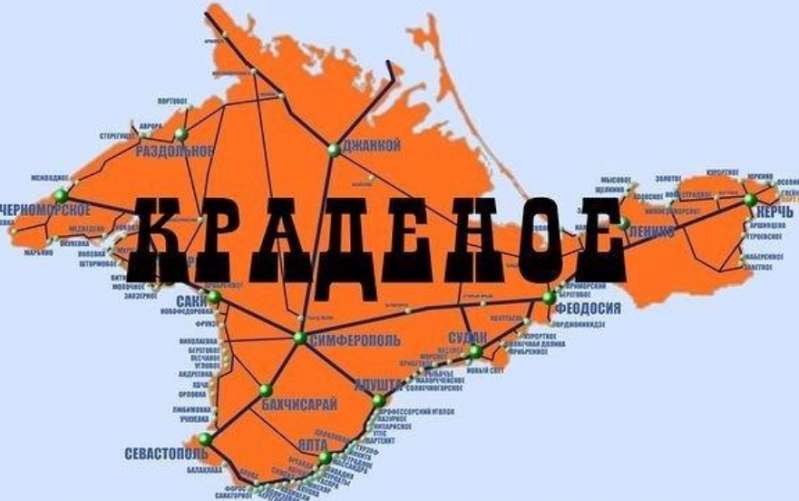Ukrainians in imminent danger of losing their land and homes in Russian-occupied Crimea

Around six and a half thousand pieces of land in occupied Crimea could be forcibly sold in the near future, with the Ukrainian owners of most of them treated as ‘foreign nationals’ by the illegal Russian occupation regime. It is vital that the victims turn to the European Court of Human Rights since Russia’s effective plunder is in grave breach of international law.
On 3 December, Inna Smal, head of the occupation ‘state committee for state registration’, reported that over 6.5 thousand land plots on coastal territory of Crimea remained in what she called “foreign possession”. She warned that these would shortly be forcibly sold by auction, although did not give any particular deadline. Judging by her figures, the owners of around five thousand plots of land have managed to sell or re-register their property since Russian President Vladimir Putin’s illegal decree on 20 March 2020, which came into force a year later. That prohibits those falsely dubbed ‘foreigners’ from owning land in around 80% of the peninsula, except for three regions without access to the Black Sea. The vast majority of such ‘foreigners’ are, of course, Ukrainians.
Russia is expressly prohibited by international law, and specifically the Geneva Convention relative to the Protection of Civilians , from any such appropriation of destruction of property in occupied territory. Article 53 could not be more explicit:
“Any destruction by the Occupying Power of real or personal property belonging individually or collectively to private persons, or to the State, or to other public authorities, or to social or co-operative organizations, is prohibited, except where such destruction is rendered absolutely necessary by military operations.”
Russia’s claim that it is not an occupying power and that “‘Crimeans voted to join Russia” has been rejected by all international bodies and democratic states, and it is hard to imagine that international courts will not side with those whom Russia forcibly strips of their property. The International Criminal Court recognized Russia’s ongoing occupation of Crimea as an ‘international armed conflict’ back in 2016, and encroachment by the occupiers on people’s ownership rights can be considered a war crime.
Radio Svoboda’s Crimean Realities recently spoke with human rights lawyers directly involved in such cases. Nikita Petrovets from the Ukrainian Helsinki Human Rights Union [UHHRU] noted that, although there have yet to be any forced auctions of property, there are already occupation ‘court’ rulings which acknowledge the person’s right to their property, as per the relevant documentation, yet still say the land cannot stay in their hands, citing Putin’s decree. Petrovets warns that this probably means that very little time remains before land is forcibly removed.
He strongly recommends that Ukrainians turn to the European Court of Human Rights [ECHR], and says that UHHRU will help them with applications, etc. Roman Martynovsky, from the Regional Centre for Human Rights, agrees, and suggests that people should not wait until specific measures are taken to remove the land. This is an ongoing violation of Ukrainians’ rights, with the latter already victims now. They could lose their land at any moment, with no legal remedies in occupied Crimea and Russia available to them. Martynovsky does, however, suggest that Ukrainian victims do still take part in such ‘court’ proceedings in Crimea and collect all relevant papers, for their application to ECHR. The many Ukrainians, however, who are living in mainland Crimea, should not risk returning to occupied Crimea themselves, but hire a local lawyer. As reported here, there have been several cases where Ukrainians have been seized in Crimea and ended up, like Valentin Vyhivsky, imprisoned in Russia or, like RFE/RL journalist Vladislav Yesypenko, facing a long prison sentence on totally grotesque charges.
Putin’s decree in March 2020 was strongly condemned both in Ukraine and abroad. One of the aims is clearly to provide yet another method for forcing Ukrainians living in Crimea to adopt the citizenship of the occupying regime. Either that, or face losing their homes, since the amount of money received in such forced auctions is likely to be significantly lower than the real value of the property. Any such ‘compensation’ would be in roubles, with it unclear how Ukrainians living in mainland Ukraine would even be able to receive the money. After Stalin’s regime forcibly deported the entire Crimean Tatar people and some other ethnic groups from Crimea, large numbers of Russia s were ‘repopulated’ in the peninsula. This was one of the reasons for the specific problems in Crimea over subsequent decades, and it is of ongoing concern that Putins’s Russia appears to be using similar techniques now.
See also War Crimes for the Hague: Russia razes home of elderly Crimean Tatar veteran activist to the ground





